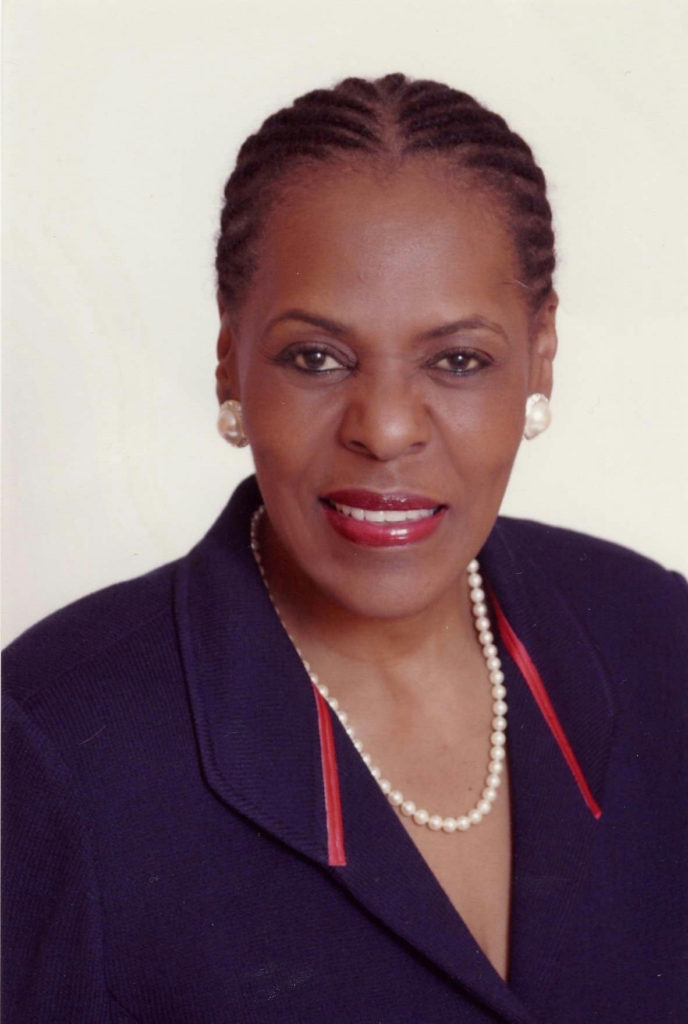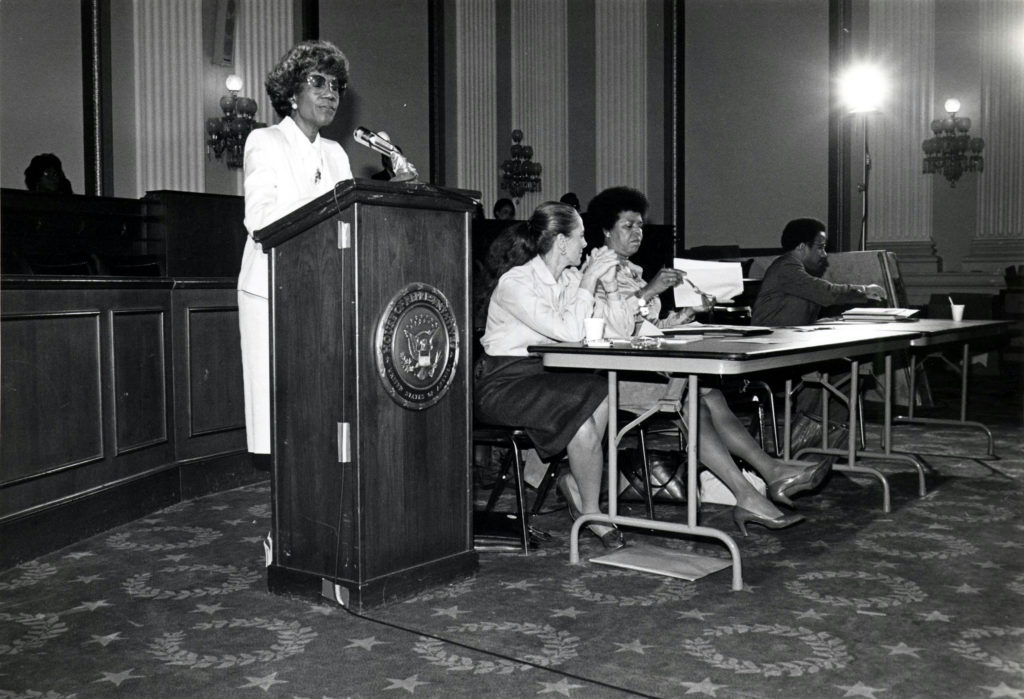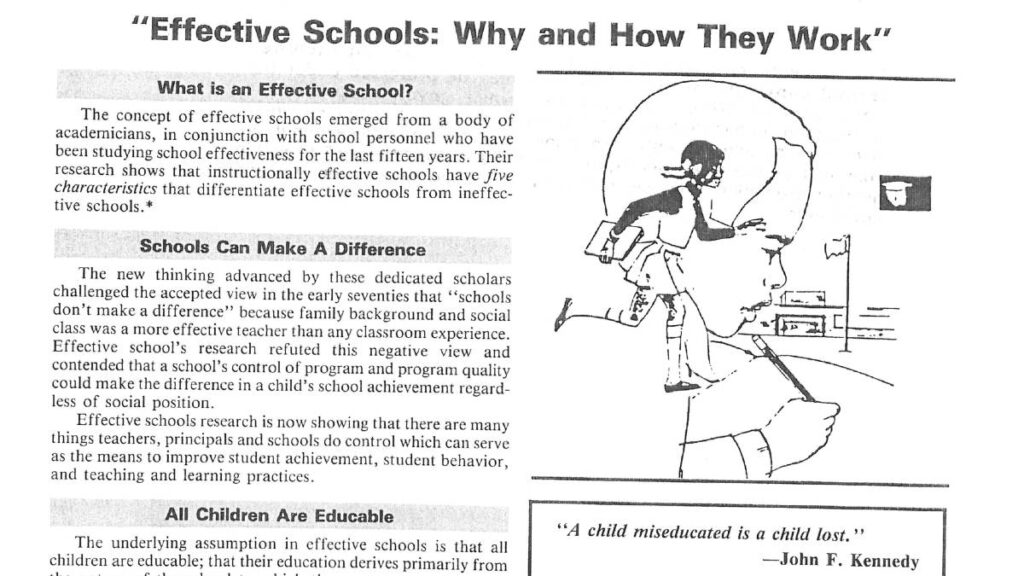Education Policy: History
Explore the role of African Americans in shaping U.S. education policy and track key milestones in the Elementary and Secondary Education Act of 1965.

Rep. Carolyn Cheeks Kilpatrick (D-MI)
Representative of Michigan’s 13th Congressional District from January 7, 1997 to January 3, 2011 (105th Congress- 111th Congress)
The history of the Elementary and Secondary Education Act of 1965 (ESEA) is tied to several educational initiatives which occurred long before its passage, but it would not be until the 1960s that Congress and President Lyndon B. Johnson recognized the strong relationship between poverty and education. Following President John F. Kennedy’s death in 1963, President Johnson made education and civil rights the foundation of his War on Poverty. In 1964, he signed into law several pieces of civil rights-related legislation, most notably, the Civil Rights Act of 1964. Working with Congress, he launched a series of programs to end poverty and increase the role of the federal government in projects aimed at the improvement of education. The Economic Opportunity Act of 1964, for example, created the Adult Basic Education Program, the first such program for adults who had not completed secondary education. Rep. Adam Clayton Powell Jr. (D-NY), chair of the Education and Labor Committee at the time, used his power to usher a number of these pieces of legislation through Congress, advancing the cause of civil rights and undergirding President Johnson’s War on Poverty.
Rep. Powell was an outspoken advocate of one bill, H.R. 2362, which would later become the ESEA. Addressing the full House of Representatives, Rep. Powell urged fellow Congress members to vote in favor of its passage.
“Every aspect of our American life demands more and better education if we are to keep pace with the rapidly changing condition of our society. We can no longer be satisfied with Federal participation concentrated upon the selected few who enter our institutions of higher learning. We are compelled to give our most sincere and dedicated attention to the masses of our American youth whose futures are bright with promise, youth who give America new visions and new goals. We must not wait any longer — it is later than you think.” (Representative Adam Clayton Powell Jr., March 24, 1965, Congressional Record, 5733-5735)
Congress began amending the ESEA almost immediately following its passage in 1965. Since then, it has undergone a number of revisions and name changes. Its premise, to ensure that disadvantaged and minority students have equal access to quality public education, however, remains unchanged. Accordingly, African American legislators have participated in shaping its evolution.
One of the major challenges to the success of the ESEA is funding. CBC members have long raised concerns about funding ESEA initiatives. For example, Rep. Andrew Young (D-GA) raised concerns about the allocations of Title I funds as proposed by H.R. 69, the Elementary and Secondary Education Amendments of 1974. In so doing, Rep. Young also shed light on the vigorous debates which took place among Education and Labor Committee members Rep. Shirley A. Chisholm (D-NY) and others concerning the ESEA and its revisions (March 12, 1974, Congressional Record 6339-6340). The important role the Education and Labor committee played in the reshaping of the ESEA was reiterated four years later, when Rep. Chisholm spoke on the House floor on behalf of her bill, H.R. 15, which would later become part of the Education Amendments of 1978. According to Rep. Chisholm, her bill was, “the product of two years of work by the House Education and Labor Committee,” on which she and other CBC members, Reps. Augustus Hawkins (D-CA) and William Lacy Clay Sr. (D-MO) all served at that time (October 14, 1978, Congressional Record, 38912). This massive overhaul of the ESEA included funding for handicapped and bilingual students as well as teachers and students in urban areas.
Six years later, Rep. Edolphus Towns (D-NY) introduced legislation which would become the Bilingual Education Amendments of 1984. His remarks to fellow Congress members acknowledged the critical need for the ESEA to address the diverse needs of bilingual students, whom he recognized as nonmonolithic.
“My bill speaks to the needs of special populations of limited English proficient students. For too long, we have assumed that the recipients of bilingual education are a monolithic population. However, we must recognize that there are gifted and talented students, handicapped students, and students in need of vocation training who are enrolled in bilingual education. Bilingual education needs to be expanded to meet the needs of these students.” (Representative Edolphus Towns, March 8, 1984, Congressional Record, 5103-5104)
CBC members Reps. George (Mickey) T. Leland (D-TX), George W. Crockett (D-MI), and Major R. Owens (D-NY), along with members of the Congressional Hispanic Caucus, spoke out in support of Rep. Towns’ bill at a Hearing of the House Education and Labor Committee. Their comments illustrate their commitment not only to the needs of bilingual students, but also their continuing civil rights crusade. Rep. Crockett’s closing sentence of his floor statement in support of Rep. Towns’ bill demonstrated his commitment to the fair and equitable treatment of all students.
“We cannot hope to become in practice a nation in which all can make the most of their native abilities if these native abilities have been stifled or sacrificed by xenophobic teaching methods.” (Representative George W. Crockett, April 3, 1984, Congressional Record, 7569)
Reminding his colleagues that language, like economics, places some children at a social disadvantage, Rep. Owens spoke out in support of Rep. Towns’ bill which provided funding for Limited English Proficient (LEP) and Non-English Proficient (NEP) students to learn in their native languages.
“Language is the vehicle that we use to learn, communicate and remember. When a child enters the school system with little or no English, he or she is at a disadvantage until English is learned. In order to make this transition it is important that the native language be used to provide general instruction and to teach the new language—English.” (Representative Major R. Owens, April 3, 1984, Congressional Record, 7572)
The strength of the ESEA and its continued relevance in the lives of American students, particularly those from low income and disadvantaged families, has to do with funding. The reauthorization and amendment of the ESEA has ensured that funding is directed towards the creation and expansion of special programs. In 1989, for example, Rep. Hawkins introduced H.R. 3, The Child Development and Education Act, which authorized appropriations to expand Head Start and other programs carried out under the ESEA. The purpose of his bill was to provide low-income families with greater access to affordable childcare.
Several more provisions of the ESEA were amended and revised in the 1990s, including some related to Native American education and charter schools. The CBC remained active in hearings and in committee on these issues.
A monumental revision of the ESEA was introduced in Congress in 2001. Renamed the No Child Left Behind Act of 2001 (NCLB) by the Bush Administration, this revision of the ESEA promoted greater accountability for states, school districts, and schools; provided greater choice for parents and students in low-performing schools; and more flexibility for the use of federal education funding. It also encouraged a stronger emphasis on reading amongst the lower elementary school students.
NCLB initially received broad bipartisan support. Speaking to the House in Committee of the Whole in the Spring of that year, Rep. Charles B. Rangel (D-NY) voiced his support of H.R. 1 (No Child Left Behind), challenging Congress to do recognize and address education as the highest priority of Americans.
“Americans consistently tell us that education is their highest domestic priority. In that context, we need to put a face on America’s education priority, the face of America’s poorest children. We must articulate our plans for the next century; a message of inclusive economic participation, self-reliance, affordable higher education, market- driven job training, world-class public schools, and accountability for educators and students.” (Representative Charles B. Rangel, May 23, 2001, Congressional Record, E976-977)
Following the tragic events of September 11, 2001, the context of NCLB shifted, making its urgency more apparent. In December 2001, Rep. Owens spoke about how the events of September 11th made all too clear the necessity of an improved education system in the United States,
“We are going to need a well-educated populace. We should not ever be in a situation again where the anthrax cleanup is so slow because there are not enough specialists around to do, especially since anthrax has been a concern of ours since the Gulf War.” (Representative Major R. Owens, December 11, 2001 Congressional Record, E9764-9766)
Later in that same speech, Rep. Owens alluded to an issue that would come to characterize the contentious debate in Congress around NCLB. His remarks about funding foreshadowed the debates to come:
“We trivialize education. We do not make it a high priority except in terms of rhetoric. The highest priority items receive the greatest portion of the budget. There is a correlation between appropriations and priorities in Congress, and we are not in the same place that American people are. They would like to have us do far more.” (Representative Major R. Owens, December 11, 2001, Congressional Record, E9764-9766)
One day later, Representative Carolyn C. Kilpatrick (D-MI) reiterated her concern about funding when she said:
“However, as I do rise in support of this bill, it is not without reservation. In a year where the President and Congress have pledged to “leave no child behind,” we unfortunately do not fulfill this commitment to those children with special education needs. Congress needs to make funding for special education mandatory, so that schools, teachers, and students with special education needs will have the tools they need to perform successfully. Congress also needs to provide more funding in the years ahead, to ensure that our nation’s public schools are able to meet the requirements laid out in this bill and face the challenges ahead of them.” (Representative Carolyn C. Kilpatrick, December 12, 2001, Congressional Record, H10111-H10112)
Following the passage of NCLB during the 107th Congress, bipartisan cooperation greatly diminished with regards to education. Speaking about the proposed budget on behalf of the CBC just two years after NCLB’s passage, Rep. Sheila Jackson Lee (D-TX) urged fellow Congress members to fully fund programs to help the nation’s impoverished school districts.
“We passed a landmark education law last year to reauthorize the Elementary and Secondary Education Act—now it is time to fund these programs fully, if we are serious about improving our nation’s schools.” (Representative Sheila Jackson Lee, April 2, 2003, Congressional Record, E655)
In the following years, CBC members, including Reps. Diane E. Watson (D-CA), Kendrick B. Meek (D-FL), and Eddie Bernice Johnson (D-TX) used occasions such as the anniversary of the passage of NCLB and the anniversary of the landmark Brown vs. Board of Education case to encourage Congress to fully fund NCLB initiatives. During the 110th Congress, CBC Chair Rep. Carolyn C. Kilpatrick (D-MI), Del. Donna M. Christensen (D-VI), and others used the commemoration of Juneteenth as a call to action to reauthorize and fund an amended NCLB.
“So we in the Congressional Black Caucus are issuing a call to action across our nation to reduce the dropout rate and raise the graduation rate above its current level of 70 percent. Keeping our people in improved schools must be a part of the debate and be addressed as we move to reauthorize and fund an amendment and improve No Child Left Behind.” (June 19, 2007, Congressional Record, H6724-6725)
CBC Members continued to introduce legislation to improve NCLB in the vein of the ESEA. Del. Eleanor Holmes Norton (D-DC), for example, introduced a Universal Pre-Kindergarten and Early Childhood Education Act during the 110th and 111th Congresses, aimed at providing universal public pre-kindergarten for all students regardless of income. Rep. Robert C. “Bobby” Scott (D-VA) introduced the Every Student Counts Act, during the 110th, 111th, and 112th Congresses, which sought to bring accountability to high schools for America’s rising dropout rate especially among students of color. Rep. Chaka Fattah (D-PA) first proposed the Student Bill of Rights in 2002 and the ESEA Fiscal Fairness Act in 2010 to ensure resource equity among schools.
At the same time some CBC members worked to amend and support some aspects of NCLB, the Caucus also presented arguments against its reauthorization. Caucus members were concerned the NCLB-mandated use of standardized tests to assess school progress and determine eligibility for funding prevented funds from reaching many of the schools most in need of aid and had a desperate impact on predominately-minority schools.
In 2011, the Department of Education, under President Barack Obama, began granting waivers to some states for certain provisions of NCLB to allow more flexibility in designing education reforms specific to schools’ needs. The CBC applauded these waivers in light of Congress’s inability to address many of NCLB’s shortcomings. However, many members were concerned that while the waivers would allow flexibility, relinquishing stronger oversight might also inhibit the federal government’s ability to protect and promote equality under the ESEA. During the first round of waiver renewals in 2014, for example, CBC Chair Rep. Marcia L. Fudge (D-OH) and CBC Education and Labor Taskforce Co-Chairs Reps. Chaka Fattah (D-PA) and Danny K. Davis (D-IL) joined Democratic members of the Committee on Education and the Workforce and the chairs of the other two Congressional Tri-Caucus groups (the Congressional Asian Pacific American Caucus and the Congressional Hispanic Caucus) to call for assurance from the Department of Education that states seeking waiver renewal were indeed being held accountable for the achievement of all students, including minority students, students with disabilities, low-income students, and English learners.
The latest major reauthorization of the ESEA came in 2015 with the passage of the Every Student Succeeds Act (ESSA) which replaced NCLB. The CBC worked with the other members of the Congressional Tri-Caucus to oppose the initial Republican-led proposals for the bill. Rep. Robert C. “Bobby” Scott (D-VA), then ranking member of the Committee on Education and the Workforce, was instrumental in brokering a compromise and was one of the chief architects of the final bill which addressed Republican desires to shift more responsibility for education back to the states while maintaining protections outlined in the ESSA for low-income and minority students.
Since passage of the ESSA, the CBC has consistently called for Congress to fully fund the act and provide additional funding for initiatives which support equity in education access. During the COVID-19 pandemic, for example, the CBC called on Congress to ensure that any educational funding provided in response to the pandemic come with strong equity guardrails to ensure states responded to the needs of low-income students of color. The Caucus was also vocal in opposing executive and administrative actions aimed at reducing federal funding and oversight in education during the first Trump Administration as well as recent efforts of Congressional Republicans to cut funding for portions of the ESSA and other education programs.
Through service on committees that oversee education and funding, the introduction progressive legislation to ensure equity and justice in education, and strong advocacy efforts on behalf students, CBC members continue to show their commitment to ensuring the critical civil rights protections at the heart of the Elementary and Secondary Education Act are upheld.



